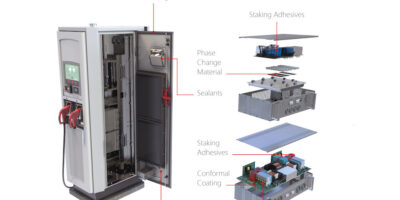Sealing, potting and thermal management range aims to boost EV charging
Sealing, potting and thermal management products designed by Henkel provide the automation-friendly features in electric vehicle (EV) charging equipment that are required for mass production and deployment. They are also claimed to ensure in-the-field attributes such as ruggedness, safety and reliability.
Materials in Henkel’s EV charging portfolio include thermal interface materials (TIMs). These ensure effective heat dissipation, whether from 220V or 1,000V. The company offers Bergquist phase change, Gap Pad and gap filler TIMs to help maintain stable operation of EV chargers’ power modules and high density components.
Gasketing and sealing to defend against damaging contaminants are also available. Exposure to changing environmental conditions, moisture and dust can damage sensitive components and reduce their operational life. Henkel sealants and Sonderhoff formed-in-place-foam-gasketing (FIPFG) technology offer customised, solutions to shield internal systems from harmful contaminants, explained Henkel.
Protection is offered with high-performance potting formulations, continued Henkel. As the interface of charging power to the EV battery system, the reliability of charging connectors is critical. Constant plugging and unplugging, rough handling and the potential for vehicle rollover all require connector protection that can withstand harsh conditions. Henkel says its cost-competitive, performance potting materials enable complete encapsulation of cables and wires within charging connectors, providing long-lasting durability and defence against moisture ingress for high voltage parts.
“Henkel’s customised, proven EV charging materials portfolio delivers for both system manufacturers and EV owners,” commented Justin Kolbe, director of market strategy for Power and Industrial Automation, at Henkel. “With solutions that are easily automated, costs are driven out of the manufacturing process while building reliable, rugged devices that will satisfy consumer expectations for all levels of EV charging devices,” he reasoned.
Central to the production, cost-effectiveness and durability of EV chargers – from Level 1 residential to ultra-fast DC chargers – are materials that enable robust operational performance, component durability and protection from harsh conditions and handling.
Kolbe, also said that there is a clear need for consumer-friendly access to charging devices. “Charging up needs to be as convenient as fuelling up at the pump,” he says. “Consumers . . . will only maintain this enthusiasm as long as the ability to use them – for short or long journeys – is made simple and reliable. Expanding the charging infrastructure cost-effectively with dependable systems is key.”




